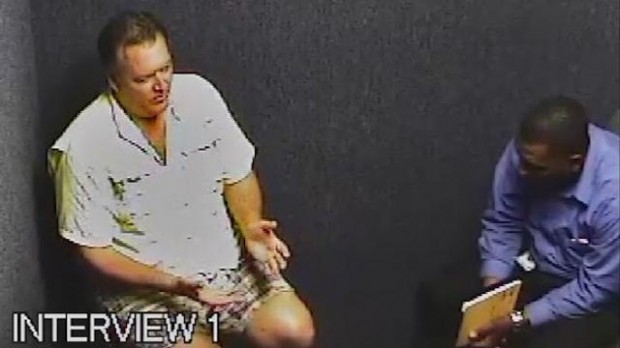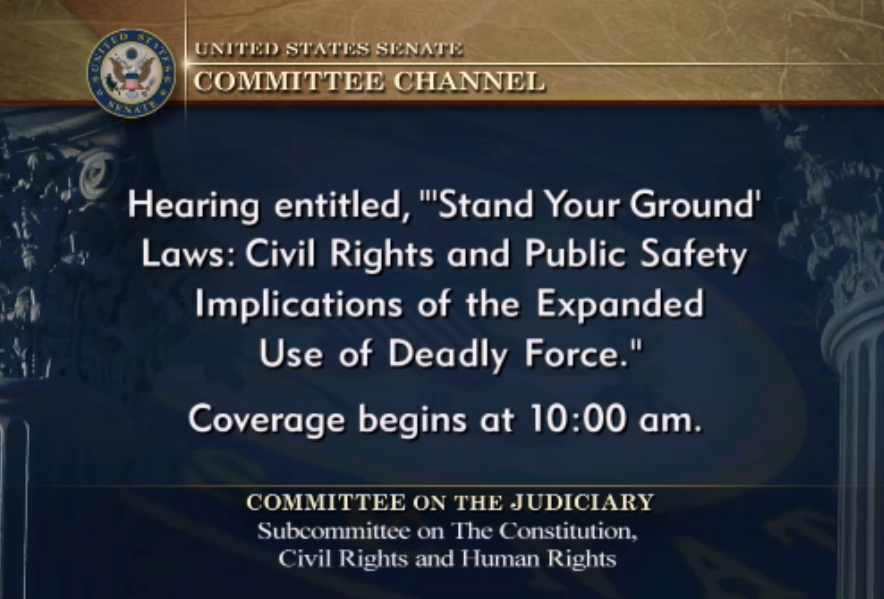“Loud Music” Murder Trial: Who is Judge Russell Healey?
 Michael Dunn on trial on charges of 1st Degree murder for the shooting death of Jordan Davis[/caption]
Michael Dunn on trial on charges of 1st Degree murder for the shooting death of Jordan Davis[/caption]
 Michael Dunn on trial on charges of 1st Degree murder for the shooting death of Jordan Davis[/caption]
Michael Dunn on trial on charges of 1st Degree murder for the shooting death of Jordan Davis[/caption]
 Michael Dunn interviewed by police following "loud music" shooting of Jordan Davis[/caption]
As we noted in our blog January 8 post on the case:
Michael Dunn interviewed by police following "loud music" shooting of Jordan Davis[/caption]
As we noted in our blog January 8 post on the case:
Fixing a glitch in the self defense law....
 Judge Russell Healey, overseeing trial of Michael Dunn[/caption]
Before we get into some of Judge Healey’s more interesting jurisprudence, it may be useful to quickly summarize the case. Michael Dunn is charged with first-degree murder in the death of Jordan Davis, a 17-year-old high school student.
Judge Russell Healey, overseeing trial of Michael Dunn[/caption]
Before we get into some of Judge Healey’s more interesting jurisprudence, it may be useful to quickly summarize the case. Michael Dunn is charged with first-degree murder in the death of Jordan Davis, a 17-year-old high school student.
The Florida city where neighborhood watch leader George Zimmerman shot and killed unarmed black teenager Trayvon Martin is changing the rules on how civilian patrols can operate to help prevent a recurrence and revive the program's reputation. The new rules, to be released at a community meeting on November 5 in Sanford, Florida, will state explicitly that residents acting under the authority of neighborhood watch may not carry a firearm or pursue someone they deem suspicious.The Reuters piece, published in the Chicago Tribune, notes that the "prosecution accused [Zimmerman] of racially profiling Martin, a high school student visiting from Miami, and then pursuing, confronting and shooting him." Nowhere in the article -- seriously, nowhere -- do they mention the vicious, life-threatening beating that Martin launched against Zimmerman without any just cause (even Martin's girlfriend, who was on the phone with him at the moment of the attack, testified that it was Martin who initiated the physical conflict). Local News 13 further reports:
Sanford's new police chief, Cecil Smith, said the neighborhood watch program as it was operated while Zimmerman was part of it was dysfunctional and had no accountability. "In this program, it is clearly stated that you will not pursue an individual," Smith explained. "In this new program, it clearly indicates that you will not carry a firearm when performing your duties as a neighborhood watch captain or participant."I expect Sanford FL will encounter one, or both, of the following two realities in short order:
 US Senate hearing: "Stand Your Ground: Civil rights and Public Safety Implications of the Expanded Use of Deadly Force"[/caption]
My first general observation is that the anti-SYG folks were, as experience would suggest, big on emotion and small on actual facts, law, or data.
One of the anti-SYG witnesses, Professor Sullivan from Harvard Law School, did raise some actual data--but when these were utterly destroyed by the later testimony of Dr. John Lott and Elliot Shapiro of CATA, Professor Sullivan was swift to discount the use of data (which he himself had introduced into the testimony) and instead focus on the "real people" behind the data. In sharp contrast, the testimony of the pro-SYG speakers was focused and direct.
Second, the anti-SYG folks persistently conflated the legal concept of Stand Your Ground with utterly discrete legal concepts, such as presumptions of reasonableness and civil/criminal immunity.
US Senate hearing: "Stand Your Ground: Civil rights and Public Safety Implications of the Expanded Use of Deadly Force"[/caption]
My first general observation is that the anti-SYG folks were, as experience would suggest, big on emotion and small on actual facts, law, or data.
One of the anti-SYG witnesses, Professor Sullivan from Harvard Law School, did raise some actual data--but when these were utterly destroyed by the later testimony of Dr. John Lott and Elliot Shapiro of CATA, Professor Sullivan was swift to discount the use of data (which he himself had introduced into the testimony) and instead focus on the "real people" behind the data. In sharp contrast, the testimony of the pro-SYG speakers was focused and direct.
Second, the anti-SYG folks persistently conflated the legal concept of Stand Your Ground with utterly discrete legal concepts, such as presumptions of reasonableness and civil/criminal immunity.
A Colorado judge denied immunity under the state's "Make My Day" law to a woman charged with 1st degree murder. The defendant, Marla Abling, has been charged with first degree murder for the strangulation killing of her estranged boyfriend, Rory Alba. The couple had a history...
A father in South Carolina who fired his handgun in self-defense--and in the process killing an apparent innocent bystander--has successfully argued that he is not subject to criminal or civil liability under the state's self-defense immunity law. South Carolina's self-defense immunity statute--§16-11-450. Immunity from criminal prosecution...
Much of the coverage of the Marissa Alexander case (previously touched on Legal Insurrection here and here) laments that Ms. Alexander was sentenced to a statutory mandatory sentence of 20 years in prison for having "merely" fired a "warning shot". The actual evidence of the...
In May 2012, Marissa Alexander was convicted of aggravated assault for having fired a gun at her estranged husband and his two children. Under Florida's "10-20-Life" law she received the mandatory 20-year-sentence for having fired a gun in the commission of a felony. We wrote about...
Andrew Branca and I gave a lecture on September 12, 2013, at Cornell Law School in an event sponsored by the Cornell 2nd Amendment Club. The topic was the George Zimmerman shooting of Trayvon Martin and subsequent trial. My segment starts at 2:45 and Andrew Branca's at...
 Veteran Jon Alexander confronts would-be robber with licensed handgun[/caption]
The muzzle may or may not have been raised sufficiently to cover Alexander’s body exposed above the counter, the video angle makes this difficult to determine, but in any case, a round fired at that angle into the counter would almost certainly have ricocheted up to strike Alexander.
Alexander extends his left hand and places it above the robber’s gun, in a position to depress it downwards. The robber momentarily lowers the gun back to his side, but maintains his aggressive, forward-leaning stance in Alexander’s face.
[caption id="attachment_64287" align="alignnone" width="500"]
Veteran Jon Alexander confronts would-be robber with licensed handgun[/caption]
The muzzle may or may not have been raised sufficiently to cover Alexander’s body exposed above the counter, the video angle makes this difficult to determine, but in any case, a round fired at that angle into the counter would almost certainly have ricocheted up to strike Alexander.
Alexander extends his left hand and places it above the robber’s gun, in a position to depress it downwards. The robber momentarily lowers the gun back to his side, but maintains his aggressive, forward-leaning stance in Alexander’s face.
[caption id="attachment_64287" align="alignnone" width="500"] Veteran Jon Alexander confronts would-be robber with licensed handgun[/caption]
The tables turn decisively as Alexander simultaneously reaches behind his right hip and draws his own 9mm pistol from what appears to be a Blackhawk Serpa holster (a common US military issue holster, and an unsurprising choice for a veteran). Alexander directs his muzzle roughly at the robber’s larynx from a distance of only inches, while maintaining his left hand in a position to deflect an attempt by the robber to raise his own handgun. Alexander says he followed this action by informing the robber that “you need to get out of here before I blow your head off.”
Veteran Jon Alexander confronts would-be robber with licensed handgun[/caption]
The tables turn decisively as Alexander simultaneously reaches behind his right hip and draws his own 9mm pistol from what appears to be a Blackhawk Serpa holster (a common US military issue holster, and an unsurprising choice for a veteran). Alexander directs his muzzle roughly at the robber’s larynx from a distance of only inches, while maintaining his left hand in a position to deflect an attempt by the robber to raise his own handgun. Alexander says he followed this action by informing the robber that “you need to get out of here before I blow your head off.”
Via Amanda Turkel at Huffington Post comes news that The Coalition to Stop Gun Violence has released a video "reenactment" of the shooting of Trayvon Martin in order to encourage people to oppose "Stand Your Ground Laws": The Coalition to Stop Gun Violence has released a chilling...
Donations tax deductible
to the full extent allowed by law.
Founder
Sr. Contrib Editor
Contrib Editor
Weekend Editor
Higher Ed
Author
Author
Author
Author
Author
Editor Emerita
